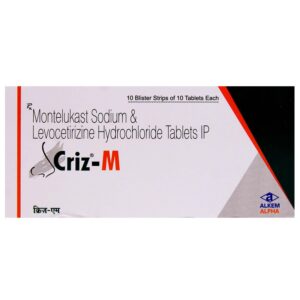MONTELUKAST + LEVOCETIRIZINE + LEVOSALBUTAMOL
Montelukast: Montelukast, also known by the brand name Singulair, is a medication primarily used to treat asthma and allergic rhinitis (hay fever). It belongs to a class of drugs called leukotriene receptor antagonists.
The main mechanism of action of Montelukast is to block the action of leukotrienes, which are substances produced by the body in response to allergens or irritants, and are involved in the inflammatory process that causes symptoms like airway constriction, mucus production, and inflammation in the respiratory system.
Montelukast is available in tablet form and is usually taken once daily. The exact dosage may vary depending on the age and condition being treated. For asthma, it is usually prescribed as 10 mg tablets for adults and children over 15 years of age, and as 5 mg or 4 mg chewable tablets for children 2-14 years old. For allergic rhinitis, it is typically prescribed as 10 mg tablets for adults and children over 15 years, and as 5 mg chewable tablets for children 2-14 years old.
Some common side effects of Montelukast include headache, fatigue, upset stomach, nausea, diarrhea, dizziness, and rash. In rare cases, it may also cause mood or behavioral changes, such as agitation, depression, irritability, or suicidal thoughts. If any of these side effects occur or worsen, it is important to contact a healthcare provider.
Montelukast is generally well-tolerated and considered safe, but it is important to follow the prescribed dosage and consult with a healthcare professional before starting or stopping the medication. It is also essential to inform the healthcare provider about any existing medical conditions or other medications being taken, as certain drugs may interact with Montelukast.
Levocetirizine: Levocetirizine is an antihistamine drug that is used for the treatment of various allergic conditions. It is primarily used to alleviate symptoms such as runny nose, sneezing, itching, and watery eyes associated with allergic rhinitis (hay fever) and chronic urticaria (hives).
The drug works by blocking the action of histamine, a substance in the body that triggers allergic symptoms. Levocetirizine specifically targets the histamine H1 receptor, preventing the histamine from binding to these receptors and thereby reducing the allergic response.
The usual recommended dose of Levocetirizine for adults and children above the age of 12 years is 5 mg once daily. For children aged 6 to 11 years, the recommended dose is 2.5 mg once daily. The drug can be taken with or without food.
Common side effects of Levocetirizine may include drowsiness, fatigue, dry mouth, headache, dizziness, and gastrointestinal symptoms such as nausea and diarrhea. However, these side effects are generally mild and temporary. Rarely, serious side effects such as an allergic reaction, difficulty breathing, or severe drowsiness may occur and require immediate medical attention.
It is important to note that Levocetirizine may interact with certain medications, so it is advisable to inform your healthcare provider about all the medications you are taking before starting this drug. Certain conditions such as kidney impairment may require dosage adjustment or cautious use of Levocetirizine.
Overall, Levocetirizine is a commonly prescribed antihistamine that effectively relieves symptoms of allergies. It is important to follow the prescribed dose and consult a healthcare professional if any concerning side effects or interactions occur.
Levosalbutamol: Levosalbutamol is a medication primarily used for the treatment and prevention of bronchospasm in conditions such as asthma, chronic obstructive pulmonary disease (COPD), and exercise-induced bronchoconstriction. It is sold under various brand names, including Levolin and Ventolin.
Levosalbutamol belongs to the class of drugs known as beta2-adrenergic receptor agonists. It works by relaxing the smooth muscles in the airways, thereby widening the air passages and making it easier to breathe. This drug provides rapid relief from symptoms of bronchospasm, such as wheezing, coughing, shortness of breath, and chest tightness.
The typical recommended dose of Levosalbutamol is 1-2 inhalations (90-180 mcg) for adults and 1 inhalation (90 mcg) for children, usually taken every 4-6 hours as needed. The dose may vary depending on the severity of the condition and the individual’s response to treatment. It is important to follow the instructions provided by the healthcare professional or the product label.
Like any medication, Levosalbutamol can have potential side effects. Common side effects may include tremors, headache, increased heart rate, palpitations, muscle cramps, and nervousness. These side effects are typically mild and transient. However, if any severe or persistent side effects occur, it is important to seek medical attention.
In rare cases, Levosalbutamol may also cause serious side effects such as chest pain, irregular heartbeat, allergic reactions (rash, itching, swelling), breathing difficulties, and changes in blood pressure. If any of these symptoms occur, immediate medical assistance should be sought.
Levosalbutamol should be used with caution in individuals with certain medical conditions, such as heart diseases, diabetes, hyperthyroidism, hypertension, and seizure disorders. It may also interact with other medications, so it is crucial to inform the healthcare provider about all the drugs being taken.
In summary, Levosalbutamol is a beta2-adrenergic receptor agonist used for the treatment and prevention of bronchospasm. It acts on the airway smooth muscles to relieve symptoms of asthma, COPD, and exercise-induced bronchoconstriction. While generally well-tolerated, it may cause mild side effects such as tremors and headache. Serious side effects are rare but require immediate medical attention. Proper dose adjustment and caution are necessary for individuals with specific medical conditions or when using other medications.

